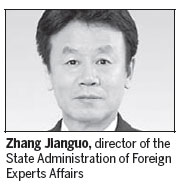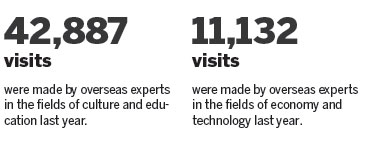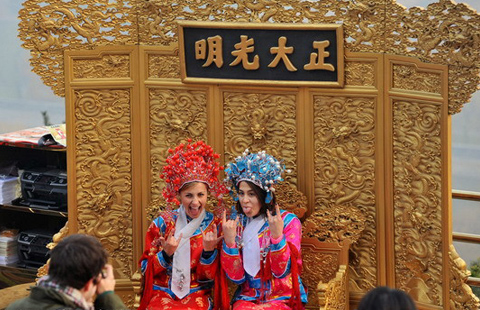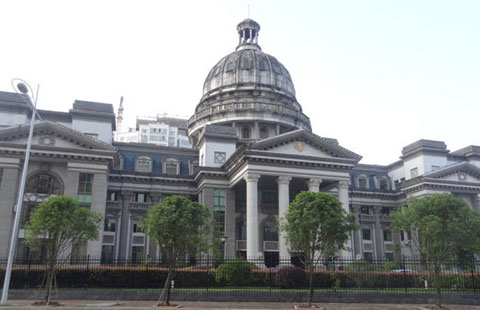Market becomes driving force for foreign talents
Updated: 2015-06-01 07:25
By Su Zhou(China Daily)
|
||||||||
Future emphasis on recruitment should focus on high-end services adding value
Zhang Jianguo had opportunities in 2013 to talk face to face with more than 100 foreign experts in different fields and from different cities about their lives and work in China.
As director of the State Administration of Foreign Experts Affairs, Zhang held the meetings to push the "1000 Talent Plan", a government-initiated global talent recruitment program. What he found interesting was that the foreign experts expressed no dissatisfaction with their salaries.
"This was a small thing, but it reflected the fact that when talking about introducing high-end foreign talent to work in China, money is no longer an issue," Zhang said. "Before, many employers in China would be reluctant to hire talent from overseas because of the limited recruitment channel, as well as the limited budget."
Zhang said the most common suggestion he heard from the experts focused on simplifying the visa application process. Many also had concerns about their children's education. And one complained about the difficulty in getting a driving license because the test is only conducted in Chinese.
"All those concerns provided us a new angle to improve our work. The government role has to be adjusted to provide a better environment, instead of simply initiating recruitment programs," he said.
China's introduction to overseas talent dates back to 1950. As part of the Soviet Union's comprehensive aid program to China, from 1950 to 1960, nearly 30,000 experts from the Soviet Union participated in China's economic development in dozens of fields, including agriculture, energy, transportation, education and technology. The majority of the 156 projects included in China's first Five-Year Plan involved experts from the Soviet Union.
Leaders in government now emphasize the importance of overseas talent working in different situations. Government-funded projects now include recruitment of non-ethnic Chinese experts who are leading experts in science and technology, and innovative teams capable of achieving critical technological breakthroughs, advancing the high-tech industries and promoting new disciplines.
Last year, 42,887 visits were made by overseas experts in the fields of culture and education, and 11,132 visits in the fields of economy and technology.
In a difference from those recruited previously, these experts are getting more involved in China's strategic planning by providing suggestions directly to the State Council. For the first time, before the annual two sessions, Premier Li Keqiang heard suggestions in January from foreign experts about the Government Work Report.
Yang Weiguo, director of the School of Labor and Human Resources at Renmin University of China, said Chinese leaders have attached unprecedented importance to talent issues.
"In a different period of development, China had different strategic tasks," said Yang. "From the adoption of reform and the opening-up policy to (President) Xi's leadership, we have to say talent is one of the most important issues of the government."
Despite favorable policies for attracting high-end overseas talents, Zhang said, "We have to admit that coming, staying, working and living in China is not as convenient as for those in the United States."
"In the past, we relied on government programs that had played an important role in the first few years. However, we have to say that in the future, we should rely more on the market and employers themselves," he said. "And the market and employers should have more say when defining high-end talent and drafting standards for Chinese green cards."
Alistair Michie, who acts as chief adviser to the State Administration of Foreign Experts Affairs, said the office plays an important role in providing an overall strategic direction for overseas talent.
"In the next 30 years, the focus has to be on high-end services, such as law, accountancy, professional services and communications. These are the service areas that produce real added value," he said.
Michie said both the public and private sectors have an important role to play.
"I think that China can benefit from attracting even more foreign talent. This can help to meet its economic objectives more quickly." he said.
suzhou@chinadaily.com.cn


(China Daily 06/01/2015 page4)
- Bridging rural-urban gap in education from start
- Overseas study consultancy offers scholarships to top 5 US universities
- China trying to reach 13 people near MERS patient
- Gaokao countdown begins with incense and prayers
- Children's Day celebrated across China
- Ballet dancers perform at Zhalong National Nature Reserve in China's Qiqihar

 Ten injured in crane accident in New York's Midtown Manhattan
Ten injured in crane accident in New York's Midtown Manhattan
 Forum trends: Becoming 'a little more Chinese'
Forum trends: Becoming 'a little more Chinese'
 Giraffe survives for five years with zig-zag neck
Giraffe survives for five years with zig-zag neck
 World's 15 most valuable brands of 2015
World's 15 most valuable brands of 2015
 The world in photos: May 25- 31
The world in photos: May 25- 31
 Solar plane departs from China to Hawaii
Solar plane departs from China to Hawaii
 Modeled on the United States Capitol
Modeled on the United States Capitol
 Highlights of National Children's Wear Design Contest
Highlights of National Children's Wear Design Contest
Most Viewed
Editor's Picks

|

|

|

|

|

|
Today's Top News
Nation's astronauts eager for foreign missions
China committed to upholding peace, stability in South China Sea
Li's trip a watershed in China-Latin America ties
Kerry delays return to US after injury in bicycle crash
Californians turn to Australia to learn how to fight drought
China issues six-point response to US remark on South China Sea issue
Chinese ambassador warns US against escalating situation in S China Sea
US envoy urges 'unity' over denuclearization of Korean Peninsula
US Weekly

|

|






